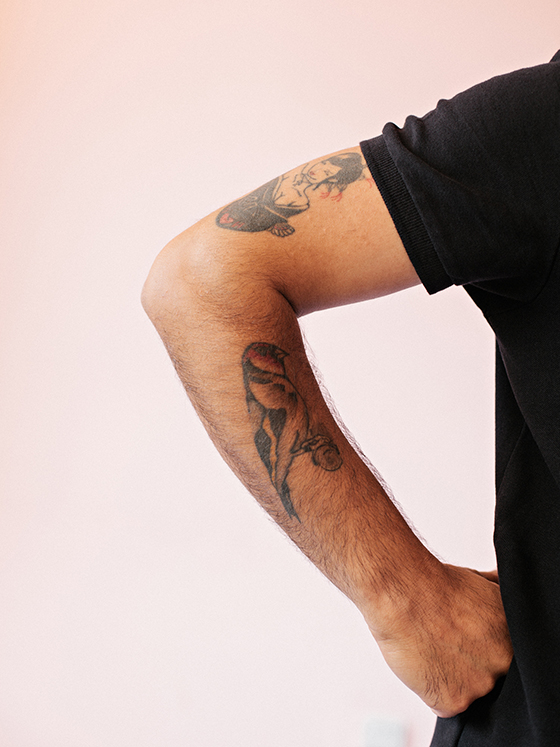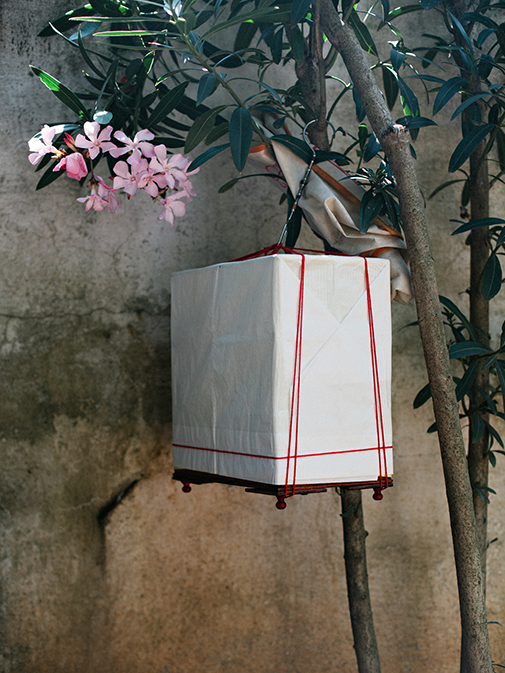Cemre Yesil & Maria Sturm
For Birds’ Sake

Cage #3, 2014, 45 x 60 cm, 3+ 2 AP, Archival Inkjet Print
Man erkennt sie in den Straßen Istanbuls nur, wenn man um sie weiß: Männer mit geheimnisvollen kleinen Kisten unter dem Arm. Aus den Kisten kommt ein Lied. Das nämlich eines Vögelchens. Die Männer fangen die wild lebenden Singvögel ein und sperren sie in einen Käfig. Nicht etwa, um sie zu verkaufen, sondern um ihrem Gesang zu lauschen. Der Käfig wird mit Stoff verhüllt, was dazu dient, die Tiere vor zu viel Stress zu bewahren. Denn unter Stress singen sie nicht. Den Käfig trägt sein Besitzer wie eine Musikbox durch den Tag.
Es gibt in der Stadt etwa 15 Kaffeehäuser, in denen sich die Vogelmänner treffen. Dort sitzen sie beieinander und hören dem Zwitschern zu, das aus den verschatteten Käfigen erklingt. Erweist sich einer der Vögel als schlechter Sänger, wird sein Besitzer gebeten, das Café zu verlassen – die anderen Vogelmänner haben Sorge, das unmusikalische Tier könne einen schlechten Einfluss auf ihre Vögel haben.
Singvögel zu fangen hat in Istanbul eine Tradition. Den Brauch hat man von den Griechen übernommen, die hier zur Zeit des Osmanischen Reiches lebten. Mit einem begabten Vogel ließ es sich
einst herrlich prahlen. Als die Stadt noch stiller war, fiel ein Mann auf, wenn er einen Käfig bei sich hatte, aus dem wunderbarer Gesang ertönte.
Heute gibt es noch einige Hundert Vogelmänner in Istanbul. Und selbstverständlich gibt es keine Vogelfrauen. Es ist eine Gemeinschaft aus einer anderen Zeit.
Wenn man heute bei der Vogeljagd erwischt wird, zahlt man eine hohe Strafe. Zwar stehen die beliebtesten Vögel der Vogelmänner, Stieglitz und Grünfink, nicht unter Artenschutz.
Doch aus gutem Grund ist es nun mal auch in der Türkei verboten, wilde Tiere einzusperren. Die Männer riskieren die Strafen. Einen Vogel in einer Tierhandlung zu kaufen kommt für sie nicht infrage.
Ihrer Ansicht nach können domestizierte Vögel einfach nicht singen.
Es gab eine Zeit, da waren Tiere ein Mittel zum Zweck. Tiere hatten keine Rechte. Die meisten Vogelmänner haben die Kunst des Vogelfangs von ihren Vätern gelernt. Und die meisten können sich kein Leben ohne Vogelgesang vorstellen.
Finken singen ähnlich wie Kanarienvögel, sie zwitschern, tschilpen und gurren. Der Gesang eines Vogels ist ein komplexes Lied, man braucht ein ganzes Leben, um es zu verstehen. Die Vögel markieren mit ihren Lauten ihr Revier, sie wollen
außerdem ihre Vitalität zur Schau stellen. Vögel, die in großen Gemeinschaften leben, singen primitive Lieder. Begabt sind die Solisten. Sie müssen Konkurrenten fernhalten und die Aufmerksamkeit potenzieller Nistpartner über große Distanz hinweg gewinnen.
Die Tradition der Vogelmänner in Istanbul stirbt aus. Nicht nur wegen der modernen Tierschutzverordnungen. Es finden sich auch immer weniger junge Leute, die Lust haben, sich die Anstrengungen des Vogelfangs anzutun. Das ist gut für die Vögel. Nur schade,
dass sich bald vielleicht niemand mehr die Mühe machen wird, ihnen so aufmerksam zuzuhören.
Tillmann Prüfer
Maria Sturm, geboren 1985 in Ploiesti, Romänien, lebt seit 1991 in Deutschland, z.Z. Berlin und Providence, USA.
Cemre Yesil, geboren 1987 in Istanbul, lebt und arbeitet in Istanbul und London.
Für das Projekt “For Birds‘ Sake” arbeiteten die beiden Fotografinnen 2014 zusammen. Die Arbeit wurde vor kurzem von La Fabrica Madrid als Fotobuch veröffentlicht und erschien in COLORS Magazine, The Guardian, British Journal of Photography und im ZEITmagazin.
Zu sehen war die Arbeit bisher während der Internacional de Fotografia de Cabo Verde, FotoIstanbul, war Finalist bei PHE OjodePez Award für Human Values 2015 und wurde bei Daire Galerie Istanbul und La Fabrica Madrid ausgestellt.
Ausstellung vom 21.05. – 18.06. 2016
* * * * * * * * * * * * * * * * * * * * * * * * * * * * * * * * * * * * * * * * * * * * * * * * * * * * * * * * * * * * * * * * * * * * * * * * * * * * *
Cemre Yesil & Maria Sturm
For Birds’ Sake

Goldfinch tatoo, 2014, 45 x 60 cm, 3+ 2 AP, Archival Inkjet Print
They can only be found in the streets in Istanbul. Men carry mysterious boxes under their arms. You can hear a song coming out of those boxes. A song sung by a wild songbird. Men capture
wild songbirds and lock them
in the cages. With no intention to sell,
they just want to hear the birds sing. The cages are covered with fabric protecting the birds from surrounding annoyance so they don’t become stressful.
Otherwise they will not chirp. Men carry the cages around during the day like they are their jukeboxes.
In the city there are around 15 coffeehouses where these men meet . They would sit together and listen to the chirping from those covered cages. If there is one bird which sings badly, the owner of such bird will be
asked to leave since they think that it can badly influence other birds.
Songbirds have a deep root of tradition in Istanbul. The custom was originated from the Greeks who lived here during the Ottoman Empire. With a talented songbird, it could be once boasted gorgeous. One birdman fell from the wonderful singing.
Today there are many hundreds of birdmen in Istanbul. But basically there is no birdwoman. It is like a community from a different time. If you get caught trying to catch songbirds, there is a high fine for penalty. Goldfinch and Greenfinch,
among of those favourite species, are not protected under endangered species. But now for the sake of goodness, it is forbidden to imprison the wild animals in Turkey. The birdmen still risk their chance trying to catch them since buying songbirds is not an option.
They just think domesticated birds cannot sing.
There was a time that animals were just objects. They had no rights. Most birdmen have learned the art of bird taming from their fathers. And these men cannot live a life without bird singing. Finches sing like canaries. They chirp and chirp then coo. The birdsong is
complex and It takes a lifetime to understand.
The birds sing to mark their territory. They also want to show the sign of their vitality. Birds which live as a large group tend to sing primitive songs. Some are gifted as soloists. They have to keep their competitors away and attract potential partners from afar for attention.
The tradition of the birdmen is dying out. Not only because of animal protection regulations but also young people are not interested to torture the birds by trapping them like this. It is good for the birds. But for some reason it is a pity that soon there will be no one who cares enough to listen to them like the birdmen do.
Maria Sturm was born in 1985 in Ploiesti, Romania and lives in Germany since 1991. Maria received her diploma in Photography and Media from University of Applied Sciences Bielefeld in 2012. Maria has won several prizes including the New York Photo Award 2012 and the DOCfeld Dummy Award Barcelona 2015
with the work “Be Good”. She’s currently doing an MFA in Photography at the Rhode Island School of Design and therefore received a Fulbright and a DAAD scholarship.
Cemre Yesil was born in 1987 in Istanbul. Her work has been exhibited and published internationally. She was nominated for the Paul Huf Award 2014 of Amsterdam Photography Museum FOAM. A selection from her “An/other” series is in Istanbul Modern Museum’s photography collection. She is the founder of FiLBooks, a space dedicated to photo books, artist talks and workshops in Karaköy, Istanbul.
Cemre Yesil and Maria Sturm have photographed “For Birds‘ Sake” in 2014. This work was recently published as a photobook by La Fabrica Madrid and featured in Colors Magazine, The Guardian, British Journal of Photography and ZEITmagazin among others. It was exhibited during Festival Internacional de Fotografia de Cabo Verde, FotoIstanbul, at Daire Gallery and La Fabrica Madrid and was a finalist at PHE OjodePez Award for Human Values 2015.
21.05. – 18.06. 2016
